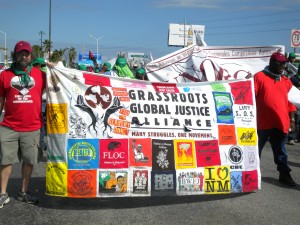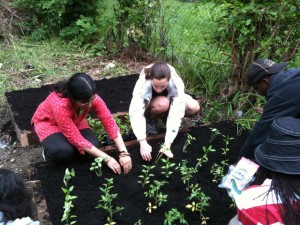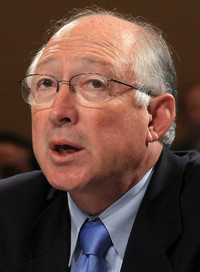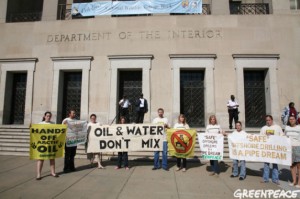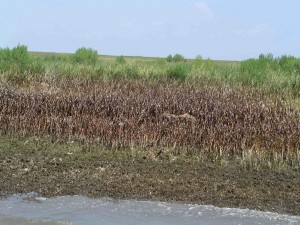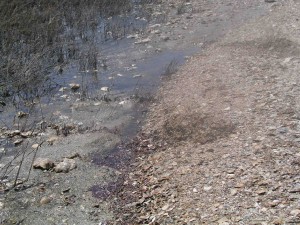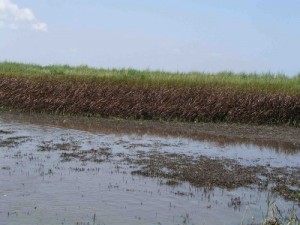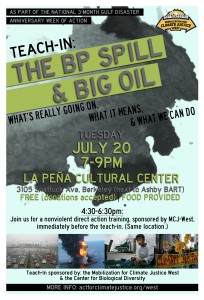(This article was originally posted on Huffington Post.)
 “The fish are safe,” declared LaDon Swann of the National Oceanic and Atmospheric Administration. This should have been good news to the audience at Alma Bryant High School in Bayou La Batre, Alabama.
“The fish are safe,” declared LaDon Swann of the National Oceanic and Atmospheric Administration. This should have been good news to the audience at Alma Bryant High School in Bayou La Batre, Alabama.
Virtually all of the 150 people attending the August 19 community forum made their living in one form or another in the Alabama fishing industry, and most had for generations, until the explosion of the Deepwater Horizon.
Having spent four months with a severely reduced, or nonexistent income, all are now desperate. Even the lucky few able to participate in BP’s Vessels of Opportunity (VOO) program are now largely out of work as BP has all but shut down the program in the area. Many can no longer afford rents or mortgages, pay medical bills, or even, in growing numbers, provide food for their families.
Even so, none appeared relieved at Swann’s words. They simply did not agree with him, as far too many continue to see far too much evidence that both oil and dispersant remain in their waters. As scientists at the University of Georgia concluded on August 17 using the federal government’s own data, as much as 79% of the 4.1 million barrels of oil BP spilled in to the Gulf “remains in the Gulf in varying forms of toxicity.”
Less then 24 hours later, in a small boat captained by Pat Carrigan, we encountered an oil slick within 15 minutes of setting off from Carrigan’s backyard on Dauphin Island. We were in the Mississippi Sound heading toward the Katrina Cut, a shortcut to the Gulf of Mexico opened when the storm split one portion of Dauphin Island off from the rest of the island five years earlier.

Photo: Sandy Cioffi and Greg Westhoff

Photo: Sandy Cioffi and Greg Westhoff
“That’s dispersed oil,” Carrigan said as we passed through a slick of light brown foamy goo. Carrigan has fished these waters for more than 20 years and is a former VOO worker. Glint Guidry, Acting President of the Louisiana Shrimp Association, shared Carrigan’s assessment. Looking at a photograph of the slick I showed him the following day, Guidry said, “That’s oil, oil with dispersant.”
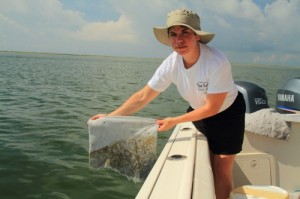
Photo: Sandy Cioffi and Greg Westhoff
The shrimpers view the slick as cause for concern because these waters were reopened to shrimping on August 8.
But, as LaDon Swann had reminded the audience at Alma Bryant, the federal government and Gulf States have established specific protocols for re-opening these waters to fishing.
These protocols state that the visual observation of oil or “chemical contaminants” on the surface of the water is cause for the recommendation that the fishery be closed “until free of sheen” for at least 30 days in federal waters and seven days in Alabama state waters.
“These waters should be filled with shrimpers,” Carrigan explained to us on the August 20th trip. Instead, there was not a single boat on the water shrimping during the several hours of this trip. “They’re just not shrimping.”
And the oil was not limited to the water.
After passing through the sheen of dispersed oil, his passengers were more than a little disconcerted when Carrigan took off his shirt and jumped into the water to pull the boat ashore as we landed at a western strip of Dauphin Island accessible only by boat. We were even more concerned when he told us to do the same as we disembarked.
After trekking through a completely untouched and unpopulated strip of wild brush, green grass, and blue flowers, we came upon a landscape opened to clear blue sky, white clouds, and a stunning white sandy beach.
Rocky Kistner of the Natural Resources Defense Council, who had arranged for the trip, looked ecstatic as he gazed at the beach — that is, until he looked down.
Huge tar balls, some as large and as thick as an outstretched hand, stretched in a line where the waves had left them, as far as the eye could see down the beach.
A baby’s sippy cup lid covered in tar sat in a bed of white sand. A Dawn dishwashing soap bottle lay covered in the sticky goo. Using a piece of bark he found on the beach, Zach Carter of Mobile’s South Bay Community Alliance bent down and started scooping tar balls into a white bucket.
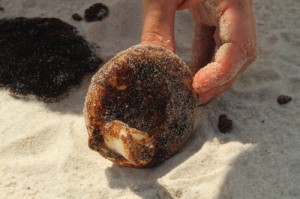
Photo: Sandy Cioffi and Greg Westhoff
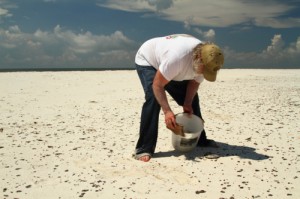
Photo: Sandy Cioffi and Greg Westhoff
“It’s not only on the beach, it’s in the water,” Carrigan said, looking stricken. He stood in the ocean, bent down, gathering more tarballs in his hands as they washed up.
Most disturbing was that the beach, accessible only by boat, was deserted. “There used to be BP workers up and down this beach cleaning it up, constantly,” Carrigan said. “Now, nothing. Just oil.”
Photos by Sandy Cioffi and Greg Westhoff (please do not reprint without photo credit)
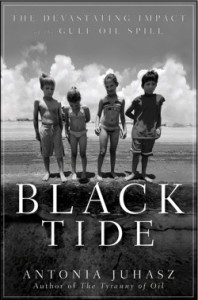 Antonia Juhasz, Global Exchange’s Energy Program Director and author of the forthcoming book BLACK TIDE: the Devastating Impact of the Gulf Oil Spill is in London now through April 15 participating in the BP annual shareholder meeting.
Antonia Juhasz, Global Exchange’s Energy Program Director and author of the forthcoming book BLACK TIDE: the Devastating Impact of the Gulf Oil Spill is in London now through April 15 participating in the BP annual shareholder meeting.
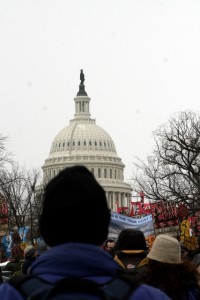
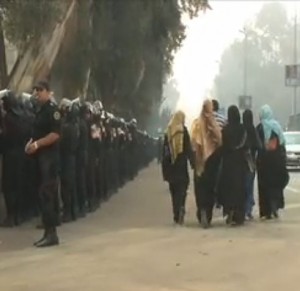
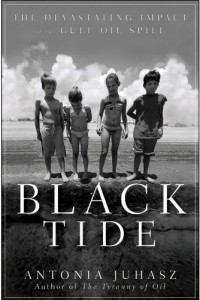 the largest oil spill in American history, and oil from the spill continues to impact lives and livelihoods throughout the Gulf. Through this tragedy we have been reminded of the negative consequences of our dependence on dirty energy and our need to support clean alternatives for people and the planet. One year after the devastating Deepwater Horizon explosion, Global Exchange’s Energy Program Director, Antonia Juhasz,
the largest oil spill in American history, and oil from the spill continues to impact lives and livelihoods throughout the Gulf. Through this tragedy we have been reminded of the negative consequences of our dependence on dirty energy and our need to support clean alternatives for people and the planet. One year after the devastating Deepwater Horizon explosion, Global Exchange’s Energy Program Director, Antonia Juhasz, 